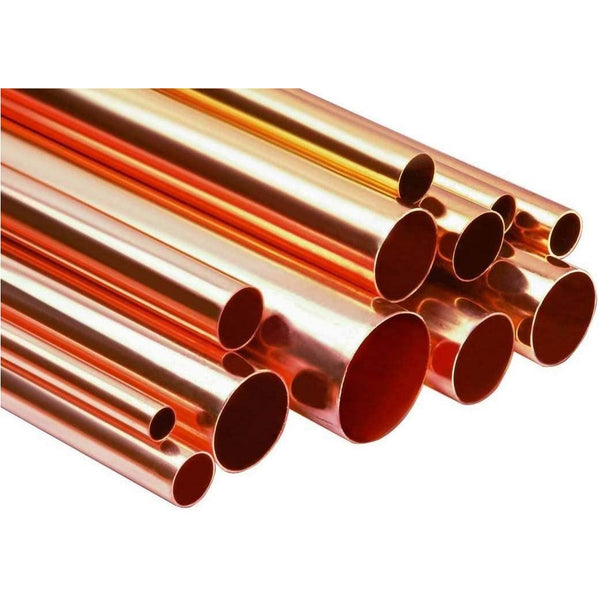Discovering the Diverse Applications of Copper Products in Modern Industries
Copper items have actually established themselves as vital components throughout a myriad of contemporary sectors, primarily as a result of their remarkable conductivity, pliability, and resistance to rust. From boosting the effectiveness of electric systems to playing a vital duty in renewable energy technologies, the convenience of copper appears. Furthermore, its recyclability placements it as a sustainable option in production and electronic devices. As sectors progressively prioritize technology and sustainability, the varied applications of copper warrant a closer assessment, particularly regarding their potential impact on future technological advancements and environmental methods.
Electrical Applications of Copper
Copper is a crucial product in the electric industry, representing about 60% of the total need for non-ferrous steels globally - Copper Products. Its exceptional electrical conductivity, which is virtually two times that of light weight aluminum, makes it the favored choice for a variety of electric applications. From circuitry systems in business and residential buildings to high-voltage power transmission lines, copper ensures efficiency and reliability in electrical power distribution
Along with wiring, copper is integral to the manufacturing of electrical parts such as electric motors, transformers, and generators. These parts take advantage of copper's thermal conductivity and pliability, essential for warm dissipation and efficient efficiency. Copper's resistance to rust enhances the lifespan and toughness of electrical systems, making it a cost-efficient option in the lengthy term.
The development of renewable energy resources, such as solar and wind power, has actually further enhanced the need for copper in electric applications. As markets change in the direction of lasting energy solutions, copper's role becomes even a lot more important. On the whole, the versatility and performance qualities of copper strengthen its status as a cornerstone material within the electric sector, driving advancement and efficiency across numerous applications.
Pipes and Piping Solutions
In contemporary pipes systems, the selection of products considerably affects both performance and longevity. Copper has become a recommended choice because of its unique homes, consisting of rust resistance and antimicrobial features. These qualities make sure that copper piping remains secure and long lasting for carrying potable water, a critical consideration in household and industrial applications.
Among the crucial benefits of copper in pipes is its ability to hold up against high temperature levels and pressures, making it ideal for a selection of applications, from warm water systems to home heating and cooling networks. Furthermore, copper's adaptability enables less complicated installation in complex piping layouts, lowering the danger of leaks and failures.
One more noteworthy advantage is copper's lengthy lifespan, usually exceeding half a century with correct upkeep. This longevity not only decreases replacement costs yet also adds to lasting methods by minimizing waste. Furthermore, copper's recyclability lines up with modern-day environmental criteria, promoting a round economic climate within the pipes market.
Copper in Renewable Energy
The flexibility of copper prolongs past pipes applications, playing a crucial function in the sustainable energy field. In solar panels, copper is made use of in solar cells and wiring, helping with effective power conversion and transmission.

Furthermore, as the international demand for electrical lorries (EVs) increases, copper's role click for source in battery systems and billing infrastructure ends up being also extra substantial. The product's capacity to conduct electricity efficiently is integral to the performance of EV batteries, improving range and billing rate.
Copper's Function in Electronic devices
Electronics producing relies greatly on copper's exceptional residential properties, specifically its high electrical conductivity and thermal effectiveness. These attributes make copper an ideal choice for a large range of digital elements, including adapters, circuit card, and electrical wiring. The metal's ability to effectively send electrical signals guarantees minimal power loss, which is crucial in high-performance electronic devices.
In addition, copper's thermal conductivity plays a substantial role in warmth dissipation, shielding sensitive parts from overheating. This is particularly important in modern-day electronic devices, where compact layouts result in raised warmth generation. Copper is additionally favored for its pliability and ductility, permitting it to be quickly shaped into intricate designs that fulfill the needs of advanced digital applications.
With the increase of consumer electronic devices, telecommunications, and electric vehicles, the need for copper in the electronics industry continues to grow. Thus, copper remains a keystone material in the ever-expanding area of electronic devices.
Cutting-edge Utilizes in Manufacturing

One significant application remains in additive manufacturing, where copper-based materials are utilized in 3D printing procedures. This allows for the production of complex geometries and lightweight components, particularly in the aerospace and automobile fields. Furthermore, copper's thermal conductivity makes it an optimal option for warm exchangers, enhancing performance in industrial air conditioning systems.
In addition, the increase of clever manufacturing has actually seen the unification of copper in IoT tools, where its conductive abilities sustain sophisticated look here sensing innovations. In the realm of renewable resource, copper is pivotal in the manufacturing of solar panels and wind generators, promoting more efficient energy conversion and distribution.
As sectors pursue sustainability and development, copper's versatility and performance remain to position it as an essential product, driving advancements in manufacturing and adding to the advancement of smarter, extra reliable items.
Verdict
In summary, copper products show remarkable flexibility throughout different modern-day sectors. Copper Products. Their premium conductivity enhances electric applications, while deterioration resistance makes sure reliability in plumbing. The essential duty of copper in sustainable energy and its essential feature in electronics emphasize its relevance ahead of time lasting methods. view it now In addition, innovative usages in making emphasize copper's versatility and enduring value. Collectively, these applications show copper's vital contribution to technical progression and commercial efficiency in contemporary society.
From enhancing the effectiveness of electrical systems to playing an essential role in sustainable power innovations, the adaptability of copper is noticeable. As industries increasingly focus on development and sustainability, the diverse applications of copper warrant a closer evaluation, specifically concerning their potential effect on future technical advancements and ecological techniques.
The development of sustainable power sources, such as solar and wind power, has actually further increased the need for copper in electric applications. Overall, the adaptability and performance features of copper strengthen its standing as a keystone material within the electric sector, driving innovation and performance across numerous applications.
The versatility of copper expands beyond pipes applications, playing an essential function in the renewable power sector.